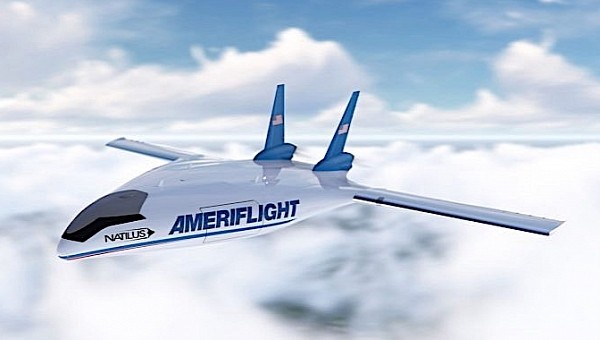For about a decade now drones of all types, shapes and sizes have redefined business, search and rescue operations, entertainment, and even wars. But there’s one field they haven’t really touched yet: air freight operations.
For an uncrewed, autonomous air vehicle to be able to transport cargo a lot of things have to be just right, from the logistics meant to support it to the machine itself. After all, these things are supposed to fly in about the same air space as crewed commercial and cargo aircraft and land at the airports we all use, and that’s not easy to do.
Yet there is one company out there which believes it has everything sorted out. In fact, operators in this business seem to think so too, and they’ve already made commitments worth $6.8 billion for a total of 460 autonomous cargo aircraft.
The company is called Natilus, and it has been around for just seven years. Its stated mission is to "reinvent the global air transport industry," and it plans to do so with a namesake family of aircraft in blended wing body (BWB) design.
We’ve discussed these machines at length in the summer of last year. The lineup comprises (only on paper for now) no less than four variants, meant for domestic and intercontinental use. They’re called Natilus 130T, 100T Nordes, 60T Alisio, and 3.8T Kona, and they should be capable of flying themselves with cargo weighing between 4.3 and 143 metric tons. The distances they can cover range from 1,035 miles (1,666 km) to 5,883 miles (9,468 km).
Also on paper, the first Natilus aircraft is scheduled to be deployed as soon as 2025, with a prototype flight scheduled for next year. Despite all this, several companies, many of them not known to the general public because of the nature of their business (names like Volatus Aerospace, Astral Aviation, or Aurora International), have already expressed interest in these airplanes.
A new name is to be added to the list as of today: Ameriflight. Officially America’s largest Part 135 carrier (meaning commuter and on-demand operations and part of the UPS chain), the company now plans to become “the first regional U.S. carrier to develop a new roadmap for the future of air freight operations” by placing an order for 20 Natilus aircraft.
The order is valued at $134 million, which puts the price of a single such machine at about $6,7 million, which is far less than we would have expected.
The order is for the smallest remotely piloted drone called Kona, which can carry 4.3 metric tons of cargo to distances of up to 1,035 miles and at speeds of 253 mph (407 mph). That makes these aircraft a perfect fit for a company that flies a lot on such short distances routes (some 1,500 departures per week).
Neither Natilus nor Ameriflight made any mention of when the Konas will become available for duty.
Yet there is one company out there which believes it has everything sorted out. In fact, operators in this business seem to think so too, and they’ve already made commitments worth $6.8 billion for a total of 460 autonomous cargo aircraft.
The company is called Natilus, and it has been around for just seven years. Its stated mission is to "reinvent the global air transport industry," and it plans to do so with a namesake family of aircraft in blended wing body (BWB) design.
We’ve discussed these machines at length in the summer of last year. The lineup comprises (only on paper for now) no less than four variants, meant for domestic and intercontinental use. They’re called Natilus 130T, 100T Nordes, 60T Alisio, and 3.8T Kona, and they should be capable of flying themselves with cargo weighing between 4.3 and 143 metric tons. The distances they can cover range from 1,035 miles (1,666 km) to 5,883 miles (9,468 km).
Also on paper, the first Natilus aircraft is scheduled to be deployed as soon as 2025, with a prototype flight scheduled for next year. Despite all this, several companies, many of them not known to the general public because of the nature of their business (names like Volatus Aerospace, Astral Aviation, or Aurora International), have already expressed interest in these airplanes.
A new name is to be added to the list as of today: Ameriflight. Officially America’s largest Part 135 carrier (meaning commuter and on-demand operations and part of the UPS chain), the company now plans to become “the first regional U.S. carrier to develop a new roadmap for the future of air freight operations” by placing an order for 20 Natilus aircraft.
The order is valued at $134 million, which puts the price of a single such machine at about $6,7 million, which is far less than we would have expected.
The order is for the smallest remotely piloted drone called Kona, which can carry 4.3 metric tons of cargo to distances of up to 1,035 miles and at speeds of 253 mph (407 mph). That makes these aircraft a perfect fit for a company that flies a lot on such short distances routes (some 1,500 departures per week).
Neither Natilus nor Ameriflight made any mention of when the Konas will become available for duty.










